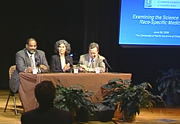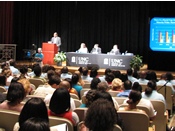 Men’s Health Disparities: Implications for Research and Intervention
Men’s Health Disparities: Implications for Research and Intervention
Bibliographic and web resources, courtesy of the UNC Health Sciences Library
Claudia R. Baquet, M.D.,M.P.H.
[bio]
Pilot Prostate Cancer Education, Screening and Treatment Program:
A Model for Policy Research on Health Disparities
[slides]
[handout]
Abstract:
The unequal burden of cancer in minority and underserved communities is well documented and is a compelling crisis. Solutions to reduce and eliminate cancer health disparities are complex and require a combination of intensive scientific, community education and outreach, and training, as well as the translation and application of innovative research models and technological solutions to address.
The University of Maryland addresses cancer health disparities through a comprehensive approach that includes research across the continuum, partnerships, leveraging of funds, care and supportive services, policy research, and community-driven initiatives. This approach combines academic and community partnerships to increase knowledge, attitudes and empowerment about healthcare with research and translation initiatives.
This presentation will describe the University of Maryland School of Medicine's comprehensive approach to reducing disparities. Implemented across the state of Maryland, this model combines multiple grant programs and specific policy and legislative initiatives and includes the development of successful community-academic partnerships, community needs assessment, and programmatic and legislative initiatives to increase knowledge, decrease barriers and impact behavior related to reducing cancer disparities and increasing participation in clinical trials research. A community-driven prostate cancer initiative currently underway in Charles County, Maryland will be described. This comprehensive education, early detection and treatment initiative is grounded in a social-ecological conceptual framework and focuses on reducing prostate cancer in rural, uninsured men, particularly African Americans.
Learning objectives:
- At the conclusion of this presentation, participants will be able to describe four components of the University of Maryland School of Medicine's comprehensive model to address health disparities.
- At the conclusion of this presentation, participants will be able to discuss the role of policy research in addressing disparities in health.
- At the conclusion of this presentation, participants will understand and provide examples of a community-driven model for addressing prostate cancer among rural, uninsured men, particularly among African American men.
Spero M. Manson, Ph.D.
[bio]
Being Male in Indian Country: The Risk of Trauma, PTSD and Alcoholism
[slides]
[handout]
Abstract:
Traumatic events -- for example, horrific automobile accidents, physical assaults, and combat -- plague nearly 70% of American Indian men between the ages of 15 and 54 years of age: equivalent to rates of exposure reported among men living in the core urban areas of Detroit, MI. Such trauma places these men at extremely high risk of Post-traumatic Stress Disorder, a chronic and debilitating mental illness that deeply affects them, their families, and communities. Indeed, the rates of PTSD among American Indian males is twice that of their White counterparts. PTSD is often co-morbid with other health conditions, notably substance abuse, but also increases one's vulnerability to cardiovascular disease, diabetes, and pain. New, innovative treatment methods are emerging, including telepsychiatry and home-based healthcare telecommunications.
Citations:
- Spero M. Manson, PhD, Janette Beals, PhD, Suzell A. Klein, MA, Calvin D. Croy, PhD, and the AI-SUPERPFP Team.
Social Epidemiology of Trauma Among 2 American Indian Reservation Populations.
Am J Public Health. 2005;95:851-859.
- Janette Beals, PhD; Spero M. Manson, PhD; Nancy R. Whitesell, PhD; Paul Spicer, PhD; Douglas K. Novins, MD;
Christina M. Mitchell, PhD; for the AI-SUPERPFP Team.
Prevalence of DSM-IV Disorders and Attendant Help-Seeking in 2 American Indian Reservation Populations.
Arch Gen Psychiatry. 2005;62:99-108.
- Jay H. Shore, M.D., M.P.H. and Spero M. Manson, Ph.D.
A Developmental Model for Rural Telepsychiatry.
Psychiatric Services. August 2005; 56(8):976-980.
Abel Valenzuela, Jr., Ph.D.
[bio]
Working Day Labor: Implications for Health and Intervention
[slides]
[handout]
Abstract:
Day laborers (mostly immigrant men who search for employment in open-air markets by the side of the road, at busy intersections, in front of home improvement stores and in other public spaces) are ubiquitous in cities across the nation. The circumstances that give rise to this labor market are complex and poorly understood. Even less understood are the men who toil in this market under demanding conditions, hazards, and abuse. The difficulties that confront day laborers are rarely contextualized in a health disparities framework. Using data and analysis from a 10-year project on day labor, my presentation will first provide an overview of this market, paying particular attention to hazards, violence, and abuse. I'll then frame why health disparities research should pay more attention to vulnerable workers. I close by discussing policy interventions and access to health services.
Learning objectives:
- Provide a socioeconomic overview of day labor work.
- Frame day labor work abuses, hazards, and violence in a health context.
- Broaden scope of health disparities research to include vulnerable workers such as undocumented day laborers.
- Present policy interventions including access to health services.
Outline:
- What is day labor? (informality, difficult work, dangerous)
- Who are day laborers? (male, high proficiency for violence, undocumented)
- Abuses (wage theft and occupational hazards are high)
- Crime and violence (day laborers more prone to be victims)
- Implications for health disparities (broaden definition - lousy jobs is a health disparity)
- Access to health services (minimal to non-existent)
- Present model/framework for explanation
- Conclusion: interventions
Citations:
- Abel Valenzuela, Jr. Day-Labor Work. Annual Review of Sociology. 2003;29(1):307-333.
- Abel Valenzuela, Jr. Working on the Margins in Metropolitan Los Angeles: Immigrants in Day Labor Work. Migraciones Internacionales. 2002;1(2):5-28.
- Abel Valenzuela Jr. Day Laborers as Entrepreneurs? Journal of Ethnic and Migration Studies. 2001;27(2):335-352.
- Abel Valenzuela, Jr. Abel. New Immigrants and Day Labor: The Potential for Violence. In: Martinez and Valenzuela (eds). Immigration and Crime: Ethnicity, Race, and Violence. New York: New York University Press, 2006:189-211.
- Abel Valenzuela Jr., Nik Theodore, Edwin Meléndez, and Ana Luz Gonzalez.
On the Corner: Day Labor in the United States
UCLA Center for the Study of Urban Poverty, January 2006 (Executive summary and full text)
Frank Y. Wong, Ph.D.
[bio]
Prevention of HIV Infection among Asian MSM
[slides]
[handout]
Abstract:
Asians and Pacific Islanders (APIs) are one of the fastest growing racial/ethnic minorities in the United States. Collectively, it makes up of 4.1% of the US population, and is projected to reach 10% by the Year 2050. At this time, over 73% of APIs are foreign-born, and the HIV/AIDS cases mirror this statistic. Although the total number of HIV/AIDS accounts only 1% of the total cases in the country, APIs have the highest proportion of cases among men who have sex with men (MSM), after white MSM. Compared to other racial/ethnic groups, APIs tend to have a lower testing rate and often received an AIDS diagnosis only when testing positive for the first time. This presentation examines some of these disturbing statistics and trends. Research gaps are identified and recommendations are made.
Citations:
- Wong FY, Campsmith ML, Nakamura GV, Crepaz N, Begley E. HIV testing and care-related services among a group of HIV-positive Asian Americans and Pacific Islanders in the United States: Findings from a Supplemental HIV/AIDS Surveillance (SHAS) project. AIDS Education and Prevention, 2004;16:440-447.
- Kyung-Hee Choi, Don Operario, Steven E. Gregorich, Willi McFarland, Duncan MacKellar, and Linda Valleroy. Substance use, substance choice, and unprotected anal intercourse among young Asian American and Pacific Islander men who have sex with men. AIDS Education and Prevention 2005;17(5):418-429.
- Kyung-Hee Choi,Willi Mcfarland, Torsten B. Neilands, Sean Nguyen, Brian Louie, Gina M. Secura, Stephanie Behel, Duncan Mackellar, and Linda Valleroy. Prevalence, Incidence, and Sexual Risk for HIV Among Young Asian and Pacific Islander Men Who Have Sex With Men, San Francisco Sexually Transmitted Diseases 2004(August);31(8):475-480.
Back to the top
Minority Health Project|
Department of Epidemiology
UNC Gillings School of Global Public Health
2104D McGavran-Greenberg, CB#7435 | Chapel Hill, NC 27599-7435
Phone 919-966-7436 | Fax 919-966-2089| E-mail Minority_Health@unc.edu
Last
updated: 5/18,20,27,29,30,31/2008 by Vic
|





